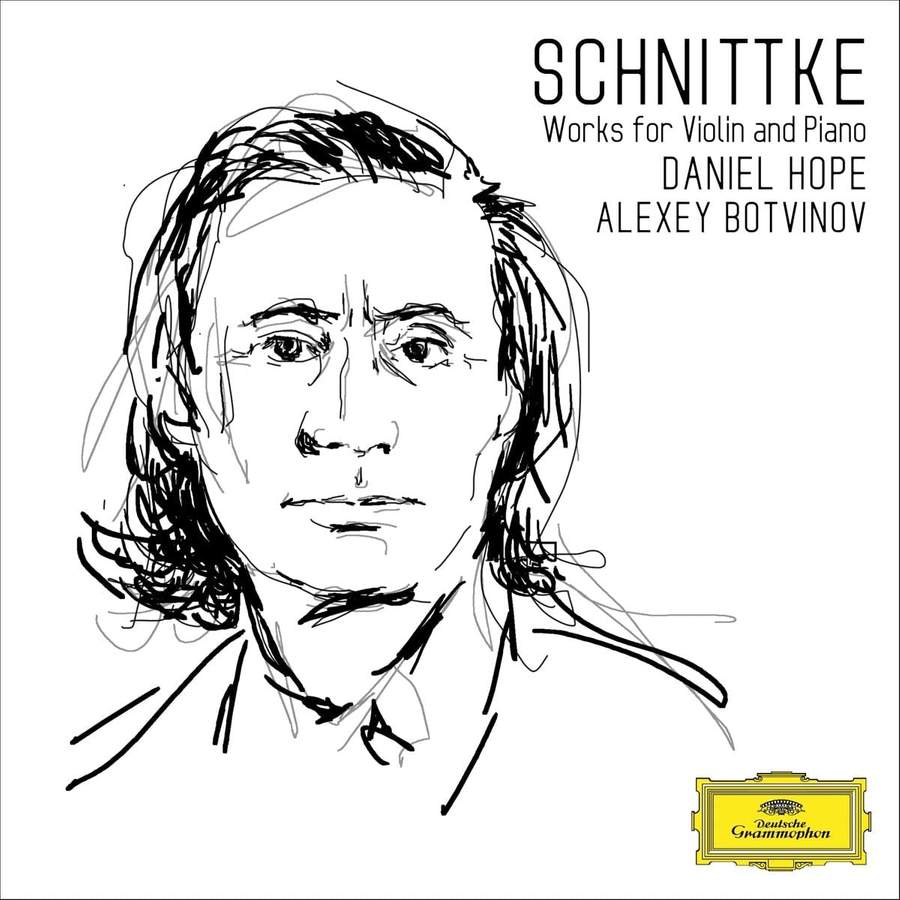SCHNITTKE Works for Violin and Piano (Daniel Hope)
View record and artist detailsRecord and Artist Details
Genre:
Chamber
Label: Deutsche Grammophon
Magazine Review Date: 03/2021
Media Format: CD or Download
Media Runtime: 59
Mastering:
DDD
Catalogue Number: 483 9234

Tracks:
| Composition | Artist Credit |
|---|---|
| Suite in the Old Style |
Alfred Schnittke, Composer
Alexey Botvinov, Piano Daniel Hope, Violin |
| Polka |
Alfred Schnittke, Composer
Alexey Botvinov, Piano Daniel Hope, Violin |
| Agony, Movement: Tango |
Alfred Schnittke, Composer
Alexey Botvinov, Piano Daniel Hope, Violin |
| Sonata for Violin and Piano No. 1 |
Alfred Schnittke, Composer
Alexey Botvinov, Piano Daniel Hope, Violin |
| Madrigal in memoriam Oleg Kagan |
Alfred Schnittke, Composer
Daniel Hope, Violin |
| Gratulations rondo |
Alfred Schnittke, Composer
Alexey Botvinov, Piano Daniel Hope, Violin |
| Silent Night |
Alfred Schnittke, Composer
Alexey Botvinov, Piano Daniel Hope, Violin |
Author: Andrew Farach-Colton
When he was 15, Daniel Hope heard a fellow student play Schnittke’s First Violin Sonata, sparking what’s become a lifelong love affair with the composer’s music. Indeed, beginning with his recording debut (Nimbus, 5/99), Hope has been gradually committing Schnittke’s violin music to disc. It’s only now, however, that he’s recorded the work that started him on this journey more than 30 years ago.
My touchstone for the First Sonata is the recording by Mark Lubotsky (the work’s dedicatee) and Ralf Gothóni (Ondine, 4/94), who both wring the maximum drama from the music’s stark juxtapositions. Hope and Alexey Botvinov take a significantly more lyrical approach in which Hope’s tonal shading and characterisation become the primary focus. Listen, for example, to how tenderly he shapes the sonata’s opening phrases – a world away from Lubotsky’s icy-hot angularity – until around 1'01", when his sound is suddenly guttural and then a ghostly shadow (at 1'17"). Yet even when drawing the rawest tone from his Guarneri, Hope never loses sight of the melodic line or makes the line seem more gesture than melody, as Lubotsky occasionally does. It’s quite a distinctive and subtly detailed view of a score that can easily come across as overly blunt.
There’s a wealth of detail in Hope and Botvinov’s performance of the Suite in the Old Style, too. I smiled at their oh-so-studious account of the Fugue, where even the occasional syncopated hiccups seem to be played with a purposeful grimace, and their elegant delicacy in the final Pantomime is quite touching. That said, I far prefer the way Lubotsky and Gothóni linger so wistfully in the Pastorale and Minuet, as it taps into a profound vein of nostalgic melancholy that gets right to the music’s enigmatic heart.
Indeed, there are times when I feel Hope and Botvinov are almost too fluent. The Gratulations Rondo, for instance, is rather briskly dispatched, and the Weill-esque Tango (from Klimov’s film Agony) lacks even a hint of a sneer or bite. By contrast, one feels every pained, drawn-out note of the solo Madrigal in memoriam Oleg Kagan, and – miraculously – a veiled radiance emerges from the disorientating grief. It’s probably not a stretch to imagine that Hope is playing it as a memorial for the composer himself.
Discover the world's largest classical music catalogue with Presto Music.

Gramophone Digital Club
- Digital Edition
- Digital Archive
- Reviews Database
- Full website access
From £8.75 / month
Subscribe
Gramophone Full Club
- Print Edition
- Digital Edition
- Digital Archive
- Reviews Database
- Full website access
From £11.00 / month
Subscribe
If you are a library, university or other organisation that would be interested in an institutional subscription to Gramophone please click here for further information.




